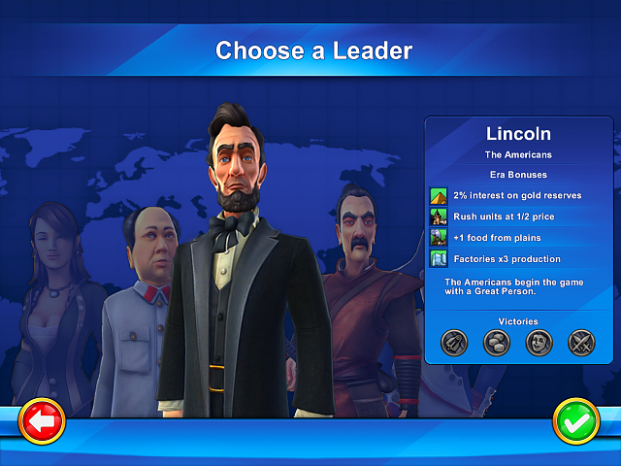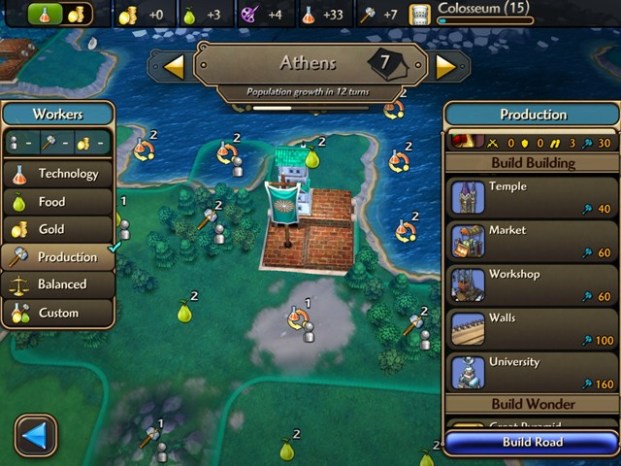Civilization Revolution 2 Review
Civilization Revolution was just that: a revolution. It brought the venerable strategy series to consoles and mobiles with a slim-line, stripped down iteration that still carried the series’ signature gameplay. But is it a trick that can be pulled off twice?
Things don’t start off well for this mobile-only sequel. There isn’t a story to follow, instead you pick from a selection of leaders – each of which provide a unique bonus – and you’re off. Winston Churchill, Napoleon and Cleopatra are all present, and their respective nation determines the name choices for your cities – London is your starting city if you pick the British Bulldog – but not much else. No matter who you pick, the technology tree is exactly the same, including the building of wonders – pyramids in New York anyone? – and the look of your units and cities depends on what age you’ve reached, not any cultural differences. It’s a shame because it means from the off that two matches are likely to look and feel the same at the start.

Surely, though, the series signature gameplay will mean that matches evolve in different ways as you progress; sometimes chasing scientific goals, other times military domination? Well, yes and no. The former because you can pursue avenues other than military, the latter because you won’t want to. You can pursue the building of wonders, or the foundation of the United Nations, and win a bloodless victory. But you won’t because it takes so long compared to a military conquest. No matter which goal you strive for, you will always need a military to protect yourself, and if it needs to be large enough to fend off the opposition, chances are it’s big enough to steamroll them.
In a fully sized Civ title this is normally balanced by the intricate diplomacy available; treaties to placate a more powerful nation, or tithes to prevent them. Revolution 2, on the other hand, is hamstrung by their exclusion. Sure, there are the occasional pop-up messages from other nations demanding gold and technology or they’ll declare war, but there is no negotiation, only four responses – conceding, offering another piece of tech, consulting your advisors or going to war. Even when you open the dialogue you only get a handful of choices. It undermines the whole system, and I found every game came down to rocketing to the second age, unlocking a slightly more powerful unit than my neighbours and then pinning them in place by spamming it as I researched the next level to finish them off.
At least it all works well on the screen. The controls are intuitive: holding on to a unit for a few seconds to select it, then double tapping where you want it to go. That double tap is a godsend, as you will forget what unit you’re currently controlling and almost send it halfway across the map. An icon on the bottom left of the screen shows how many units are left to move, and tapping it takes you to the next idle one, while production and resource rates span the top. On a small screen it may be a little fiddly, but on an iPad it’s perfect.

But all of these are things I remember the original Revolution getting right first time around. Firaxis haven’t built upon the systems of the original, and have instead just transplanted them directly into this sequel. The same accusation can be levelled at the graphics. It looks exactly like the first game – which came out in 2008 – to the extent that I’m certain some of the assets are identical. It isn’t that they don’t look good – Rev 2 looks great – but six years on you would be forgiven for expecting more.
VERDICT: And here we come to the main problem of Civilization Revolution 2: it’s a sequel. If the original didn’t exist, then I’d be praising Rev 2 for bringing the Civilization series to mobile. Instead, this is a game that doesn’t need to exist. Don’t get me wrong, it’s great in its own right, but Firaxis wants you to pay for almost exactly the same game as last time, half a decade on – and that just isn’t good enough.

DECENT. A 6/10 indicates that, while this game could be much better, it still has a fair amount to offer the player. It might be an interesting title sabotaged by its own ambition, or a game denied greater praise by some questionable design choices. Don’t avoid it outright, but approach it with caution.
Review code provided by publisher.





